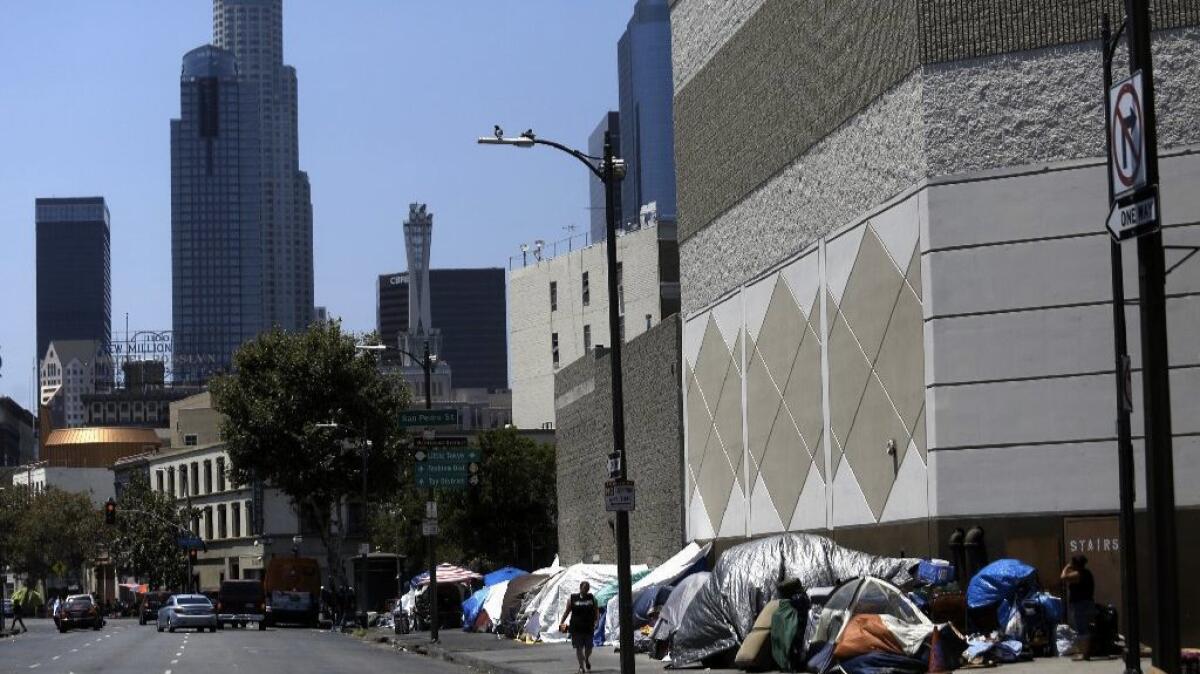This is what L.A.’s homeless voters have to say about the presidential election

- Share via
Among the record 19.4 million Californians registered to vote is a group that is rarely explicitly addressed – the homeless.
In Los Angeles, where homelessness has continued to rise, downtown shelters have held registration drives, encouraging men and women to get out to vote. On election day, some are designated polling places for those whose addresses lean toward temporary.
Homeless Angelenos who are registered to vote will have the chance to cast their support for measure HHH, a plan to buy permanent supportive housing for the homeless. And like every other American, they’ll have their say on the next president of the United States.
For several of L.A.’s homeless, the choice between presidential nominees Hillary Clinton and Donald Trump doesn’t have as much to do with how a candidate will address homelessness. Instead, they’re focused on how that person will fix the problems that mired their lives before.
“I’m afraid that everything that was done for the LGBT community is going to go downhill and we’re going to have to start all over again.”
Abigail Malecki, 46, came out as a transgender woman in 2011, after she’d left New York and landed in Los Angeles. In 2014, her gender and name, inspired by “Dear Abby” and a character on NCIS, became legal. Still, she faces discrimination.
“I’ve had people tell me I’m an abomination. I’ve told them that they must be an abomination too. Hatred is a sin.”
She became homeless in 2009 after losing her job. While she does not blame her job loss on being transgender, she does worry that employment opportunities claiming to be trans-friendly are not a reality.
“We’ve still got a long way to go before the hatred towards the trans community is gone,” she said.
Malecki is voting for Clinton in the hopes that the Democrat will continue the progress that the Obama administration has made for the LGBT community.
“I was the one pushing grocery carts, talking to myself, panhandling and looking for food.”
Mental illness and alcohol and drug addiction led David Noriega, 50, to homelessness. He hopes that the next president will focus on those issues, among other problems that plague the war vets and domestically abused women and children who have shared his streets.
Originally a supporter of Sen. Bernie Sanders, Noriega has been on the fence between Trump and Clinton, and worries about the direction of the country.
“We might fall apart. I’m afraid of that,” he said, noting the divisiveness of this year’s politicking.
He’ll make his decision on election day.
“Even if I did get a minimum wage job, the rent was totally unaffordable.”
Jon Lewis was a bartender and a bar manager for 20 years. When he lost his job three years ago, he moved into his van and started applying for jobs online – more than 100 times, he says.
Lewis is voting for Trump, despite being told he’s crazy to do so. He believes the GOP nominee will be able to fix the issues that have led him to homelessness.
“The unemployment rate is high. I think that would change,” Lewis said. “I think if our economy is doing better, that will address the homeless problem.”
“When I got out of the service, I was so paranoid that I wouldn’t be able to make friends or talk to people. The only people I could talk to were my bartender and my drug dealer.”
Ajay Williams, 26, served two tours in Afghanistan while in the U.S. Navy. It was on a tour to Somalia that he started using drugs to distract himself.
Now, after years of combating the issues he brought back with him, he wants a president who will prioritize the needs of Americans over the issues of other countries.
“I knew skid row was a place, but I never knew it was third-world country in the United States,” he says.
Once a supporter of Barack Obama, Williams is now voting for Trump, confident that he will address those concerns.
“We went from motel to motel.”
Pamela Walls lost her Section 8 housing in 2001. She spent time staying with family and couch-surfing with friends, living under bridges and on picnic tables before she landed at the Women’s Center in downtown Los Angeles.
“That’s what homeless people do. They try to sleep anywhere they can.”
With that at the forefront of her mind, Walls wants one of the major focuses of the next president to be housing. She hopes the job will go to Clinton.
Twitter: @cshalby
ALSO:
Homelessness became a crisis in L.A. during the 1980s, but the city struggled to act
Attacked, abused and often forgotten: Women now make up 1 in 3 homeless people in L.A. County
A fix for L.A.’s homeless crisis isn’t cheap. Will voters go for $1.2 billion in borrowing?
On the Streets: A 12-part video series about homelessness in Southern California
More to Read
Get the L.A. Times Politics newsletter
Deeply reported insights into legislation, politics and policy from Sacramento, Washington and beyond. In your inbox three times per week.
You may occasionally receive promotional content from the Los Angeles Times.











